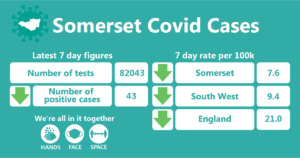Welcome to the latest edition of the weekly Somerset Covid-19 update for key stakeholders. This update is produced on behalf of the Somerset Covid-19 Engagement Board and is designed to provide a weekly update on the current Covid-19 situation in Somerset.
Somerset’s Covid-19 data continues on a steady decline. The seven-day rate is now 7.6 per 100,000.
On Monday 17 May we moved to Step 3 of the roadmap and we hope everyone has been enjoying their new freedoms, but are doing so with caution so we can remain on track for the further reduction of restrictions on 21 June.
People can meet outdoors in a group of up to 30 people, indoors with six people (or two households) and can now stay overnight at someone’s house who is not in their household or support bubble.
It is now up to the individual to make a personal choice on whether to socially distance from their friends or family when meeting up – we urge everyone to be very careful as Covid-19 is still with us as has been highlighted with the numbers of cases involving the variant B.1.617.2 which was first identified in India.
The message of hands, face, space and fresh air is especially important when mixing indoors. When meeting up indoors, good ventilation and circulating fresh air is very important. We know Covid-19 is easily transmissible in badly ventilated indoor spaces. We have attached a graphic giving some good hints and tips for better ventilation. When you let friends in, let fresh air in too.
Many people in Somerset are now making testing a part of their normal weekly routine with our testing rate remaining higher than the South West average. Testing is vital as it helps us quickly identify and isolate those with the virus who may not necessarily show symptoms. We all need to remember the lateral flow testing is for those displaying no symptoms of the virus (known as asymptomatic) – if you have any Covid-19 symptoms you should request a confirmatory PCR test online or by calling 119. These tests are vital in helping identify variants of concern.
And it is also of great importance to self-isolate should you test positive to reduce the spread of Covid-19. We will discuss this in detail in the section below.
The Somerset Dashboard which tracks our local epidemic from the start in March, to the current time.
‘Remember, everyone can catch it, anyone can spread it’.



| David Fothergill, Leader of Somerset County Council Twitter: @DJAFothergill | Trudi Grant, Director of Public Health Twitter: @SomersetDPH | Clare Paul, Cabinet Member for Public Health and Wellbeing Twitter: @Clarepaul_ |

In the week up to 8 May approximately 82043 tests were carried out across the county and there have been 43 new confirmed cases. The rates have decreased since last week and our rate of 7.6 is lower than the South West rate of 9.4. We have all seen the danger of variants of concern in various regions of the country so we must continue all the protection measures such as hands, face, space and fresh air as Covid-19 is still here.
We have had minimal new cases at educational and social care settings in the week up to 15 May.
THIS WEEK’S HEADLINES:
The main items featured in this week’s update are:
- Workplace, care and school settings
- Vaccination update
- Contact Tracing / Local 0 (zero)
- Testing Update
- Communications Focus
- Step 3 of the Roadmap
- Self-Isolation guidance
- Accessible resources
Workplaces: All workplaces need to be very aware of the need for good ventilation – particularly indoor hospitality now we have moved to Step 3.
It is also important for the required workplaces to make it clear and easy to customers about using QR codes when visiting premises, and that each person needs to register not just one for the group.
It is important for all business to be Covid-19 secure and there is some excellent guidance can be found on the GOV.uk website.
The evidence shows Covid-19 is transmitted in an airborne way. It is for this reason we continue to ask all businesses to think about how they will ensure a flow of fresh air through their premises. It is also still very important to ensure businesses have a robust cleaning regime to keep all high touch surfaces contamination free and it is a combination of testing, good ventilation and routine cleaning which will allow us all to keep progressing through the road map.
Advice for ventilation in the workplace:
- Employers should provide employees with clear guidance on ventilation, why it is important, and instruction on how to achieve and maintain good natural ventilation or to operate systems if there are user controls.
- It is important to identify and deal with areas which are not well ventilated. The more people occupying a poorly ventilated area, and the longer they remain in it, the greater the risk of spread of Covid-19.
- Control measures such as avoiding certain activities or gatherings, restricting or reducing the duration of activities, providing ventilation breaks during or between room usage should be considered alongside ventilation for reducing the risk of airborne transmission.
We also would like to highlight the following advice to employers which should be followed if any of your workers test positive:
Employers should call the Self-Isolation Service Hub on 020 3743 6715 as soon as they are made aware about any of their workers who have tested positive. Employers will need to provide the 8-digit NHS Test and Trace Account ID (sometimes referred to as a CTAS number) of the person who tested positive, alongside the names of co-workers identified as close contacts. This will ensure all workplace contacts are registered with NHS Test and Trace and can receive the necessary public health advice, including the support available to help people to self-isolate.
Further information can be found on the GOV.uk website.
We are aware some employers who have registered for the national LFD testing programme have not received their kits. Please find below some central guidance for businesses who have registered but have not managed to sign-up:
Once you have signed up, you should have received a link to egress. Please note – it will be sent to the email address provided during the sign up on the Government website.
The link may have been blocked by your organisations spam filter. If you speak to IT, they may be able to see. Otherwise, please access it via the egress website. This will take you to the sign in page and then you can register and/or access the workspace.
Please make sure to read the information in the Documentation zone, including the Read Me First file which can help to guide you through the platform. You will also need to ‘click to accept’ on the Legal Declaration Form Zone. Once you have done this, you will be given access to the Private Sector Onboarding Form zone where you can fill in the Onboarding Form. Our team will then process your request.
Care Sector: We are pleased to say cases of Covid-19 continue to be low within social care settings. We continue to support settings as required to talk through queries and help with prevention.
There were a few changes to the guidance this week – for outbreaks in care settings, staff and residents should be tested via PCR 14 days after the last resident or staff had a positive test result or had coronavirus symptoms. If certain Variant of Concerns are detected through genomic sequencing, further risk assessment will be undertaken and may include extending the outbreak to 28 days after the last positive test. Otherwise, if after the 14 day end of outbreak testing there are no positive results, the outbreak can be declared over. Then regular testing can be resumed. Guidance can be found here: Coronavirus (Covid-19) testing for adult social care settings
Day care centres also have some changes to their testing regimes for staff and service users. Staff are to perform 2 rapid lateral flow tests and 1 PCR every week preferably before starting work. Service users can still visit centres if they haven’t had a test as testing is not mandatory. For those who can test, to test twice a week via rapid lateral flow tests.
Personal protective equipment (PPE): resource for care workers working in care homes during sustained COVID-19 transmission in England
There are also a few clarifications and updates in the PPE guidance to be familiar with to ensure adherence to the latest guidance to keep ourselves and the people we care for safe.
Following on from last week’s Mental Health Awareness Week and the focus on connecting with nature, we would like to ensure all our social care staff are taking some time to look after their own health and well-being. Information about mental health and wellbeing, including the five ways to wellbeing can be found on the Mental health and wellbeing pages of our website.
All the information and guidance related to Covid-19 within adult social care settings can be found via Somerset Safeguarding Adults Board
Schools and Early Years settings: We continue to see very little activity in terms of positive cases. Ongoing, we need to ensure everyone continues with the routine of regular testing for those eligible; this applies to all educational staff and students of secondary school age.
Vaccination Update: All people aged 34 and over are now being offered the vaccine so please go online or phone 119 to book if you have not already done so and are in this age group.
And if you are offered your second dose – please do accept it at your earliest convenient date, or book it online if offered the chance whilst booking your first vaccine this is especially important as we are seeing a rise in variants of concern, as the Health Secretary Matt Hancock mentioned this week in his address to the public Full information regarding the vaccination program can be found here: Covid-19 vaccinations in Somerset – Somerset CCG
Contact Tracing / Local 0 (zero): All local Covid-19 contact tracing has now been brought in-house which will mean residents who have tested positive for Covid-19 will be contacted by a local contact tracer instead of NHS Test and Trace.
This will drastically reduce the amount of time required to track cases and provide a more efficient response to further outbreaks if they arise.
We believe the early identification of person-to-person transmission is vital to keeping the number of Covid-19 cases low in Somerset. Our local contact tracers, as well as seeking to understand activities undertaken, will also be able to provide support to people who have tested positive and for members of their households who will also have to self-isolate.
As previously mentioned, the huge benefits of this system are:
- Better engagement by our local citizens.
- Outbreak Identification.
- Better local support and wellbeing for citizens and call handlers.
Also, this weeks Covid Catch-up movie focusses on the local Contact Tracers and can be found on YouTube.
Regular Testing: The move to Step 3 occurred on May 17 and this has allowed opportunities for more mixing of people both inside and outside. This is great news and welcomed by many, after the months of restrictions endured this year. To be able to maintain this level of interaction, whilst not risking an increase in spread of COVID infection, it is still vital regular testing is maintained by the public. No matter what your job is, how much interaction you have with others, or if you’ve received the vaccine, testing to identify cases of COVID is imperative. We strongly advise everyone regularly tests for COVID-19, to be able to continue to keep friends and family safe, allowing the success of the vaccination programme to continue. There are several ways in which you can obtain lateral flow tests (LFT), as found on the Somerset County Council website.
For lateral flow testing to be an effective tool in the management of infection rates testing should be performed twice weekly, 3-4 days apart, in those who do not display any symptoms of COVID. Performing lateral flow testing less frequently than this means people could be infected with the virus, and it may not be picked up by the test. LFTs are designed to identify high amounts of virus in an infected individual. As the infection progresses, the immune system clears some of the virus in your body, reducing the amount of virus present. By regularly testing, it’s more likely that the lateral flow test will be performed at a high time when there is a high volume of virus present. Identifying cases of infection sooner reduces the amount of spread, and protects more people.
We understand lateral flow testing can be daunting and unfamiliar, which is why you can have a supervised lateral flow test performed at a pharmacy within Somerset. During an appointment, they will be able to guide you through the process of how to correctly swab yourself, how to perform the lateral flow test and answer any questions you may have. They will also be able to provide you with a kit of lateral flow tests if you feel comfortable enough to perform testing at home afterwards. A list of pharmacies which provide supervised lateral flow testing can be found on the above link.
Whilst case numbers of COVID are low currently, we still require people with a change or loss of their sense of taste and/or smell, high temperature, and/or new continuous cough to get a PCR test. This can be done by phoning 119, or requesting one online: Get a free PCR test to check if you have Covid-19. Anyone who tests positive by lateral flow test, will need to take a follow up PCR test too, by ordering in the same way.
Communications Focus: This week we will be focusing our communications on Step 3 of the Roadmap, and also highlighting the importance of self-isolating should you or other members of your household test positive for Covid-19.
Step 3 of the Roadmap: We are reaching the end of our first week in Step 3 so we thought it would be a useful reminder to everyone about what we are allowed to do at this step of the roadmap. We have also included the links to the rules regarding travelling abroad.
- There’s new guidance on meeting friends and family, stressing personal responsibility and caution rather than telling you to stay two metres apart from anyone you don’t live with.
- You can socialise indoors in a group of up to six people or two households, including for overnight stays, and up to 30 people can meet outside.
- Indoor hospitality, such as restaurants, pubs, bars and cafes, can reopen. Venues will not have to serve a substantial meal with alcoholic drinks nor will there be a curfew. However, customers will have to order, eat and drink while seated.
- Indoor entertainment including cinemas, museums, and children’s indoor play areas, can reopen with Covid-secure measures in place.
- Organised indoor sport, including group exercise classes, can take place.
- All holiday accommodation, including hotels, hostels and B&Bs, can reopen and be used by groups of up to six people or two households of any size.
- Up to 30 people will be able to attend significant life events such as weddings, bar mitzvahs, christenings, receptions, and wakes, depending on the capacity of the venue.
- Funeral attendance is no longer be limited to 30 people but will be determined by how many people the Covid-secure venue can safely accommodate with social distancing.
- The Government is also allowing people to attend some larger performances and sporting events indoor and outdoor, with restricted numbers.
- Care home residents will be allowed up to five named visitors (two at any one time), provided visitors test negative for Covid-19.
- There will no longer be a legal restriction on travelling abroad, but a traffic light system with strict testing and quarantine rules depending on whether you return to England from a red, amber or green list country Red, amber and green list rules for entering England – GOV.UK (www.gov.uk)
- You should continue to work from home if you can. When travelling within the UK, you should aim to do so safely and plan your journey in advance.
And if you are meeting friends in a park or an outside setting, ensure you keep your distance as our message remains – stay local and continue to follow ‘hands, face, space and fresh air’ to minimise catching Covid-19 and spreading it to others – even if you have been vaccinated.
Transmission rates are highest in enclosed spaces so ensure the rule of 6 is understood and adhered to – we have come so far and we really need to keep up the good work.
Make sure you understand and abide by the current rules and restrictions on meeting others.
Self-Isolation guidance: If an individual has tested positive for Covid-19 it is vital they self isolate to prevent the spread. By doing this as quickly as possible it helps to protect friends, family and the local community.
If people need to self isolate they need to complete the full isolation period – and this means staying home and not going out to work, to the shops or to exercise. Those isolating may be eligible to access the test and trace support payment scheme, which provides a £500 payment to help during their isolation. If they do not meet the eligibility criteria for the test and trace support payment, there are other local organisation such as the Village Agents who will explore what other support options are available based on the individual needs. Full information, including how to apply for the £500 grant can be found here: Self Isolating Guidance
Resources and further information: Please do keep an eye our Healthy Somerset website, which has a huge amount of information and resources to help keep everyone healthy happy and safe at this time.
For the latest local information as well as digital resources, posters and flyers please visit the Somerset County Council website.
The Somerset Local Outbreak Management Plan outlines how we, the council, will work with the NHS Test and Trace Service, PHE, the NHS and other partners to ensure a whole system approach to preventing and managing local outbreaks. This can be found here.
Finally, please like them on Facebook, follow them on Twitter and share their posts with your networks to help them in communicating these important messages. Follow their Director of Public Health Twitter account too.

